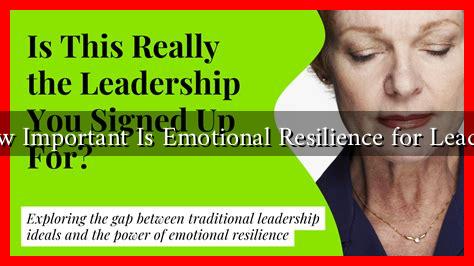-
Table of Contents
How Important Is Emotional Resilience for Leaders?
In today’s fast-paced and often unpredictable business environment, emotional resilience has emerged as a critical trait for effective leadership. Leaders are not only responsible for guiding their teams toward achieving organizational goals but also for navigating the emotional landscape of their workplaces. This article explores the significance of emotional resilience for leaders, its impact on team dynamics, and strategies for developing this essential quality.
Understanding Emotional Resilience
Emotional resilience refers to the ability to adapt to stress, adversity, and change while maintaining a positive outlook. It involves managing one’s emotions effectively and bouncing back from setbacks. For leaders, emotional resilience is crucial as it influences their decision-making, interpersonal relationships, and overall effectiveness.
The Importance of Emotional Resilience in Leadership
Leaders face numerous challenges, from managing team dynamics to making tough decisions under pressure. Here are several reasons why emotional resilience is vital for leaders:
- Enhanced Decision-Making: Resilient leaders can think clearly and make informed decisions, even in high-stress situations. They are less likely to be swayed by panic or anxiety, allowing them to weigh options rationally.
- Improved Team Morale: A leader’s emotional state can significantly impact their team’s morale. Resilient leaders inspire confidence and positivity, fostering a supportive work environment.
- Effective Conflict Resolution: Leaders with emotional resilience are better equipped to handle conflicts. They can approach disagreements with empathy and understanding, leading to more constructive outcomes.
- Adaptability to Change: In a world where change is constant, resilient leaders can adapt quickly and guide their teams through transitions, minimizing disruption and maintaining productivity.
Case Studies: Resilient Leaders in Action
Several prominent leaders exemplify the importance of emotional resilience in their careers:
- Satya Nadella (Microsoft): Since becoming CEO in 2014, Nadella has transformed Microsoft’s culture by promoting empathy and collaboration. His resilience during the company’s transition from a software-centric to a cloud-centric model has been pivotal in its success.
- Indra Nooyi (PepsiCo): As the former CEO, Nooyi faced numerous challenges, including market competition and changing consumer preferences. Her ability to remain resilient and adapt PepsiCo’s strategy led to significant growth and innovation during her tenure.
Statistics Highlighting the Need for Emotional Resilience
Research underscores the importance of emotional resilience in leadership:
- A study by the American Psychological Association found that leaders with high emotional intelligence, which includes resilience, are 60% more effective in their roles.
- According to a report by the World Economic Forum, emotional intelligence will be one of the top skills needed in the workforce by 2025, emphasizing the growing importance of resilience in leadership.
Strategies for Developing Emotional Resilience
Leaders can cultivate emotional resilience through various strategies:
- Self-Reflection: Regularly assess your emotional responses to challenges and identify areas for improvement.
- Mindfulness Practices: Techniques such as meditation and deep-breathing exercises can help manage stress and enhance emotional regulation.
- Building Support Networks: Surround yourself with mentors and peers who can provide guidance and support during difficult times.
- Continuous Learning: Engage in professional development opportunities that focus on emotional intelligence and resilience training.
Conclusion
Emotional resilience is not just a desirable trait for leaders; it is essential for navigating the complexities of modern leadership. Resilient leaders can make sound decisions, foster positive team dynamics, and adapt to change effectively. By investing in their emotional resilience, leaders can not only enhance their own performance but also create a more resilient and engaged workforce. As the business landscape continues to evolve, the ability to remain emotionally resilient will undoubtedly be a key differentiator for successful leaders.
For further reading on emotional intelligence and resilience in leadership, consider exploring resources from the American Psychological Association and the World Economic Forum.

